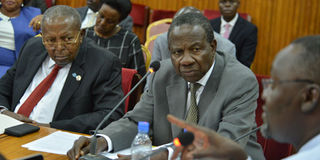Kasaija blasts BoU over closed banks

Probe. Bank of Uganda Governor Tumusiime -Mutebile (left) and Finance minister Matia Kasaija (centre) appear before the Parliament Committee on Commissions, Statutory Authorities and State Enterprises on Friday. PHOTO BY ALEX ESAGALA
What you need to know:
- The committee will tomorrow have an exit meeting with officials from BoU and Ministry of Finance to conclusively iron out what exactly motivated the closure of banks with particular attention on a separate forensic report into Shs478b that BoU claims it poured in to Crane Bank to help it remain afloat.
Finance minister Matia Kasaija on Friday blamed the collapse of seven commercial banks on Bank of Uganda officials.
The minister who was appearing before the Parliamentary committee investigating abuse of processes in the closure of seven banks, in no uncertain terms, condemned the manner in which the central bank governor, Mr Emmanuel Tumusiime-Mutebile and his team handled the closure of banks.
Interacting with Members of Parliament in the presence of the governor and his deputy, Dr Louis Kasekende, the board members and other stakeholders, Mr Kasaija showed remorse over the disputed closure of banks and accused the central bank of acting in a manner akin to a doctor who poisons a patient who is still breathing and even proceeds to cut off oxygen in order to kill him.
“It is very unfortunate that there is a patient who is still breathing and you as a doctor, you give him some poison to finish him off. Not only remove the oxygen but you even put poison. The best way to do things is to see if the bank has any chance to survive, we do everything possible to make it survive,” Mr Kasaija said.
BoU faulted
Mr Kasaija was commenting on BoU’s failure to revive the troubled banks, especially local banks and why the central bank closed National Bank of Commerce (NBC) and Crane Bank even after the shareholders of the two banks submitted clear capitalisation plans and even mobilised part of the required money the central bank had demanded.
For NBC, former shareholders have testified that they raised the Shs7b that the central bank had set for capitalisation but Ms Justine Bagyenda, the former director for commercial banks supervision, instead demanded that the money be invested in treasury bills.
The Shs7b was deposited in BoU on Ms Bagyenda’s orders and the central bank moved and closed NBC for apparently being under-capitalised by Shs300m, according to former Prime Minister Amama Mbabazi, who was a major shareholder in the bank.
Mr Amos Nzeyi, one of the former shareholders, told MPs that he borrowed from Exim Bank to raise the required funds only for BoU to close NBC. To date, Mr Nzeyi is still paying Shs165m every month.
In Crane Bank’s case, the former owner, Mr Sudhir Ruparelia, has testified to MPs that former shareholders had mobilised $23m (about Shs84b) that was supposed to be injected to save the bank but it was instead seized by the central bank which then closed it in 2016 for under-capitalisation.
MPs heard that Crane Bank shareholders even applied for a loan from BoU as a lender of the last resort to capitalise the bank but they refused.
When these dealings were brought to the attention of Mr Kasaija by MPs investigating the closure of banks on Friday afternoon, the Finance minister criticised the manner in which the central bank handled the closure of banks, saying that it should have pulled all the stops to ensure that the banks remain in business.
Implication on the economy
Mr Kasaija indicated that he projected that the closure of Crane Bank would reflect very poorly on the economy with foreign investors particularly wary of pouring money in an economically fragile market.
To forestall future banks from going under, the minister revealed that the government has now instituted a Depositor’s Protection Fund (DPF) worth Shs500b to act as a fall-back option for struggling banks.
He explained that when governor Mutebile brought to his attention the plight of Crane Bank, he telephoned Mr Ruparelia and suggested to him measures that would lead to the recapitalisation of the bank but the property mogul was not very receptive to the minister’s ideas.
The BoU governor explained that Crane Bank was a significantly undercapitalised institution as defined by law, posed a systemic risk to the stability of the financial system and that the continuation of Crane Bank’s activities in its current form is detrimental to the interests of its depositors.
The committee chairman, Mr Abdu Katuntu, asked why the central bank did not have a revival plan before the closure of the banks, as envisaged by the Financial Institutions Act, but was rather only interested in closing banks without any plan on how to revive them. Even after they had raised the money to recapitalise, BoU took their money and closed them.
The committee will tomorrow have an exit meeting with officials from BoU and Ministry of Finance to conclusively iron out what exactly motivated the closure of banks with particular attention on a separate forensic report into Shs478b that BoU claims it poured in to Crane Bank to help it remain afloat.
This money remains unaccounted for and the Auditor General is looking into the expenditures.



